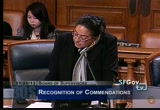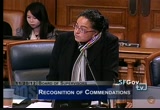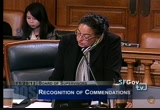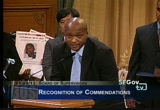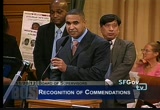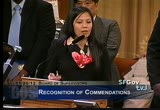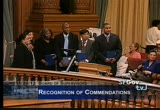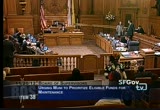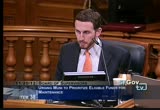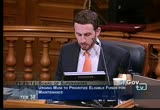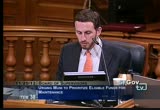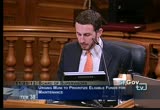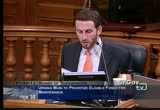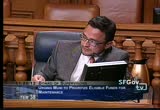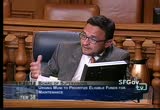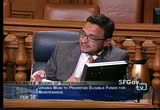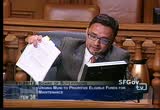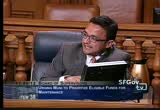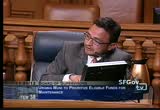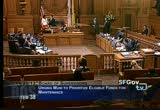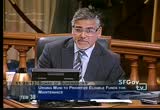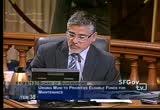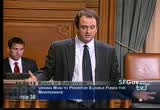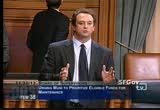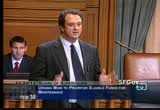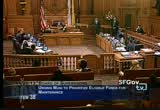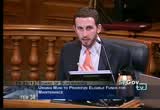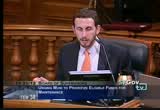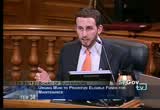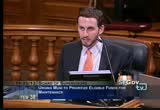tv [untitled] November 23, 2012 5:00am-5:30am PST
5:00 am
as counselor for juvenile strives to go above and beyond duties as house staff for the housing development. he embraces daily challenges faced by public housing residents by bringing encouragement, opportunity and resources with the goal of helping representative residentr lives. philip came to the u.s. from hong kong when he was a teenager. he attended george washington high school and worked as a youth counselor for the mayor's office summer youth program. he was a vista volunteer with the california youth authority before joining the san francisco housing authority?hp$k in '78. he holds a banc bachelor's degre from san francisco state university. he's a member of board of directors for self-help of the
5:01 am
elderly. pamela, earned a injuries doctor and a public law certificate from the university of san francisco school of law and became a member of the state bar of california in 2010. she chaired the student bar association diversity committee, nationally recognized with the american bar association henry j. ramsey jr. award towards advancement of diverse individuals. pamela also earned a bachelor of arts at the university of california at davis. leland reuben was born and raised in san francisco, where he first developed a strong passion for working with l÷pápñ community. he currently oversees the intensative job readiness and works with the housing authority to help residents overcome barriers and develop workforce skills that help secure full time employment. prior to joining good will
5:02 am
mr. reuben worked at the san francisco sheriff's department as director of the new violence alliance. and finally, martha hollands a graduate of balboa high school and a former student of city college with an aa degree in child development she has been a volunteer worker for 15 years. she is very passionate about student rights and organized the black student union at both balboa and mission high schools. she is a true leader of our community having been a vocal advocate for residents of holly court and plaza east. she has been a strong voice for residents and was recurrently elected president of the plaza east tenant association. it is with pleasure that i say congratulations to you and wanted to mention that ms. hollands is a minister in training. so that being said, if you'd all like to say a few words about your work, that would be great. >> i want to suably say thank
5:03 am
you and i really appreciate it. i work for the san francisco housing authority. i'm a eligibility worker at the robert pace development. been a team effort. for the last three or four months really appreciate your help over there because you came down there, you walked around, you see that the tenants met with everybody and it really encouraged people and being an opportunity for jobs is like -- it's awesome. the tenants are happy. we have opportunities for families to have, you know, christmas, you know, a better christmas thise%( ;p year. and i really appreciate that and i really just want to thank you, amen. >> i'm property manager of -- i've been there for about three years. and earlier in the year, in this last shooting, killing peace so thank you for the use of -- to join us, not to -- jobs, and all my -- in the housing authority support. with all determine support what
5:04 am
we care today. everybody. >> hi. i wanted to say thank you to the supervisor olague for recognizing us today and getting m[ all of you here. good will has afforded me the opportunity to go out into the economically challenged and provide opportunity for them to awaken their new future through employment. although we know there are many challenges that face those who passion is derived off being able to give them the ability to employment and empower themselves. so i want to thank you very much for this opportunity of recognizing this today. i thank you for your recognition. and i just wanted to say that i'm sure that my colleagues will agree with me in saying that it's not about us, it's about the work that we do in the
5:05 am
community. and us moving if order to continue this great work. >> pamela, for the san francisco housing authority. thank you, supervisor olague. you are one of many officials -- or few officials who actually come on site and ask the representatives what they want and -- residents what they want and what they need. that in and of itself is what really encouraged staff to partner with community organization. thank you to good will for providing these opportunities to our residents, and thank you to our dedicated staff at robert pitt. they worked tirelessly. i want to acknowledge my parents who are in the audience who have inspired me to pursue a career in public service. my father is a vietnam and gulf war veteran and my mother is a public servant of the alameda county.
5:06 am
5:07 am
the rest of our calendar to our please call item 38. >> clerk calvillo: item 38 was considered by the government audit and oversight committee at a special meeting on november 19, 2012 and afforded to the -- forwarded to the board, muni to prioritize funding for vehicle maintenance and purchase in light of deteriorating muni services. >> president chiu: supervisor wiener. >> supervisor wiener: i always pick the easy ones. thank you, mr. president. i introduced this resolution to highlight the critical importance for muni to maintain its vehicles and invest in its system. muni services has been deteriorating and that has to stop. muni is the life blood of san francisco, carries approximately 600,000 people a day and for many particularly low income working class peopleu and seniors muni is the only way
5:08 am
to get around. given the critical importance of muni to our day-to-day life the voters in 1999 amended the city charter to declare muni's top priority is to provide reliable and convenient transit service to all neighborhoods. i'm sorry to say that muni mass not been fulfilling that voter mandate and we as a city -- and this subject about pointing -- isn't about pointing fingers, are responsible for this decline. we need to take responsibility for our decisions over the years and decisions we continue to make and the impacts of those policy decisions on muni. for decades, we, as a city, have underinvested severely in muni. there's always a reason for divertindiverting money away frm investing in the system. we can always think of great ideas for using muni maintenance, vehicle, and other operational money for a purpose other than makingsrñz muni more reliable. there's always a great reason and mo enthen gets converted and
5:09 am
muni and thes'h2b8y riding publc suffer. it's now time to stop using muni money that can be used for maintaining and improving the system for things other than operations and reliability. we need to do this not tomorrow, not a year from now, but now. muni has 420 million in deferred maintenance on its fleet and we see the consequences of that number every day. we haven't purchased enough vehicles, and we have no backup vehicles when they break down."- when vehicles have broken down, we've been sloi to fix them, we fix them inadequately and sometimes they're not even fixed at all and they sit idle. we've significantly reduced our rehabilitation of vehicles including mid-life overhauls. we've switches signals and other infrastructure that are aging and failing. for the system. in august and september, muni's ontime performance was
5:10 am
approximately 58%, over 600 runs were missed in the second half of october, riders of course see this in a lesyb ibt numerical y every day when there are gaps in service, when people are forced to get off a vehicle because there is no replacement driver, or when people have to jam into a bus or accí7 light rail vehic. muni recently was approved for performance initiative. this funding is required to be increase ridership. there is no more effective way to achieve these goals than to have a system that's in good shape, that's reliable and on which people believe they can depend. this funding should be dedicated 100% to improving muni's deteriorating reliant bywpi'm maintaining and purchasing muni vehicles and improving muni's operation. the resolution before us today so provides. mta board of direction is
5:11 am
considering a proposal to use a portion of this regional funding not for improving muni's reliability but rather to fund free muni passes for youth, free as opposed to the 70% discount muni already provides. i've been public in my skepticism of the free muni for youth program. my skepticism has been based on and my belief the program would come from muni's operating money. we're now seeing that's the case that muni is considering using some of this maintenance program rather than to invest that money in the system to purchase more vehicles, to rehabilitate vehicles and otherwise make the system more reliable. once the free muni pilot program ends there will be enormous pressure to extend the program and that pressure almost certainly will include using more funding that could be used to improve muni's reliability. reasonable minds can differ on whether you should ride muni for
5:12 am
free. i respect the views of the supporters of this program, my free youth fares is different than the operational funding to pay for the program. the most important thing we can do for all san franciscans, and particularly for those who are dependent on muni for their transportation needs, is to provide a reliable system. so, colleagues, i respectfully ask for your support on thisb+(; resolution. >> president chiu: supervisor campos. >> supervisor campos: thank you very much, mr. president. seems that in the last few months, supervisor wiener and i '( s&tj show on the road. we've had this exchange at different times, not only in these chambers but also beforehm the metropolitan transportation commission. and i#?( mx certainly respect supervisor wiener and his position, and i think that he was correctonnny in saying thate
5:13 am
are -- you know that reasonable minds can disagree with this specific matter. but let's just step back a little bit and talk about sort of what we're talking about here. the issue of the free muni for youth pilot project has been somethingyd( :r+rpá this board s been dealing with for more than a year. and at different times, his different actions have been taken by[(%( cnç city agencies , including a resolution that was supported by seven members of this board, urging the san francisco mta to begin a free muni for all youth program, pilot program here in san francisco. the matter went to the mta board the proposal so that it views of some of the people who had voted against the original proposal, and limited the scope to allow for free muni for low
5:14 am
income youth. and some of the people that had objected to the original proposal, my understanding, had indicated that they would support something that wasn't for all youth but for low income youth. the caveat that the mta board of director provided in the resolution they passed was that it was predicated on the pilot actually receiving funding from the region. so that it wasn't just muni funding the pilot, but that in fact the region could support it. we went to the mtc and there were actually two votes taken. because it allocated money from a specific source. and then at the request of one of the individuals who actually voted against the funding of the pilot, there was a new funding source that was found by the mtc staff. that's what's before you today. the resolution that the mta
5:15 am
board of directors passed approving a free muni for low income youth did not specify what funding source the money came from. it left that question open. but in terms of the funding that we're talking about, we have to make clear that the mtc provided in the approval for the use for this very type of pilot, that in fact it was found the funding at the request of someone in fact commissioner tiny of marin, so that this kind of a pilot that we're talking about could be funded with this money. so the idea that was put out there, that somehow this is not what this funding was intended for, respectfully is not happened at the mtc. but the main point that i want to make is this. you know, i don't know that anyone herei0÷s=úñ questions the
5:16 am
importance of investing in the maintenance of muni, and improving the reliability of the system, and making sure that we have a system that works for every rider. but the notion that we have to choose between that and actually making public transit affordable to low income kids, to me, is a false choice. the two are not mutually exclusive. in fact, as mr. reiskin himself noted during the hearing, and as was noted during the presentation of the tpi funding, the money that has been allocated for san francisco, it's money that can be used for different things. and the fact that the mta board of directors chooses to use this increase the accessibility of public transportation for low income youth does not mean that the mta cannot, at the same time, turn around and use some of the money for maintenance.
5:17 am
that somehow the lack of reliability of the system of an agency that has anpvpx& $800 min budget rests solely on the fact that it's going to make public transit more accessible to low income kids, it's simply not reflective of the reality that has been true of muni for the last few years. muni, to the extent that their issues about maintenance, the reason for that is not because of the funding of these types,%f programs. to the extent thatmine is failing or hasjpn,1 to address those issues, it is not because of somehowqpihb making public transportation more accessible to poor kids in this city. i think it's simply unfair to place that responsibility on that group. we all have ajr:ñ responsibilito make sure that we have a
5:18 am
reliable system, and the working families and the poor families of this city are as interested in increasing the reliability as any. but to simply say that we have to choose one or the other, to me, is not accurate. it is not a choice that has to be made. it is not how san francisco should operate its public transit system. we can have an accessible system that is reliable. the two are not at adds -- odds with one another. so, colleagues, i have circulated through the clerk a set of amendments that provides language that reflects the position that indeed you can maintain the system, and still provide accessibility to low income families, and kids in the city. and so i hereby make a motion to amend the resolution presented by supervisor wiener along the lines outlined in the amendment
5:19 am
that has been distributed. so moved. >> second. >> president chiu: supervisor campos has made a motion as described seconded by supervisor olague. on the motion to amend, supervisor avalos. >> supervisor avalos: thank you, president chiu. i will be supporting this amendment. it makes much sense because i was very concerned that the original resolution overturned probably a year's work, i think longer than a year's work, of the, you know, hundreds of young people who worked, organized across san francisco, to get a policy of free muni for youth, at least for low income youth. i believe that at one point i remember the author of this resolution had discussed well why don't we make it for low income youth and we can support free muni for low income youth and now we have a resolution that pretty much says this should only be used for
5:20 am
maintenance. so i'm really happy to support amendments that include, you know, prioritizing free muni for low income youth and maintenance. needed to actually help bring up the next generation of muni users. i know we talk about effectiveness all the time, and i think that there could be no other effective way of making sure that young people are going to be riding muni and riding muni without any stigma attached about whether they have a pass or not because they will be able to ride without -- ride for free. so we know that will effectively help many youth choose to get on muni and do it with legal means. i know what was always -- and we raised the muni pass up to 22 million, that effectively made it difficult for a lot of young people to be able to afford on our muni buses. we saw that there were about 40% fewer passes that were issued to young people after the increase. that's something to give great pause about whether this is the
5:21 am
right policy moving forward. so i'm happy to support this amendment, and i actually want to really congratulate the young people, organizations like power, and coleman advocates for youth, youth commission, youth students from public schools and private schools, who were all on board for this, you know, free muni for youth program. it would be great to see it pass. and we can actually have a great example for other cities in the bay area to follow. i know there's a lot of interest in the bay area as well seeing that happen. >> president chiu: supervisorú/] elsbernd. >> supervisor elsbernd: thank you, mr. president. through the president, supervisor campos, i struggle today to follow your logic. i have a real difficult time. just 20 minutes ago we heard you present the choice that the police department was going to have to face was violence in the mission or enforce public
5:22 am
nudity. that's not a false choice? i mean that's one of the most bogus choices i've heard. i didn't say anything because i think everyone here knows hour police department knows how to prioritize. that wasn't a budgetary issue. that's not a false choice but this is. i hope everyone here understands a budget has to be equal. revenues must equal expenditures. you are in a box. there is not a concept that it's an unlimited budget. if it wass/jpmc an unlimited bui would agree with you. it would be a false choice. we only have so much money. that requires us to make choices. that's what a budget document is. we have heard over and over again, a budget documentbfpf,ñ a testament to what our priorities are. there's no false adjective necessary. we are choosing. i agree, this is a worthy program. i do. i commend you for pursuing it. the problem i see in it is we have to make a choice, a real
5:23 am
one, what are our priorities. and for me, priority's making making sure our buses are clean, making sur1jpmr(ú9q that youtd to take the bus to school actually have a bus that's on time and clean and can get there. these dollars, you're right, mtc said could be used for this program but mtc also said it could be used for anything. and when i make the budget choice, i want to prioritize safe buses. i want to prioritize buses that are going to operate. and to muni, i said this in the hearing, not surprisingly director reiskin is not here today. this is a $1.6 million project. can anybody identify for me the funding that's going to help fund it for the remaining seven months? director reiskin couldn't. it was unidentified. i mean respectfully, supervisor campos, i've heard you beat the crap out of departments for4n( ñ
5:24 am
putting forward programs with unallocated dollars. this is an unallocated project, $1.6 million is only for the first five months. he's hoping that we get money in 2013-14. the inconsistency here is mind-boggling. i understand this is your passion. i understand you want to deliver it. but we were told over and over again no moneys that could be used in our general operating budget would fund this program. that is exactly the opposite of what is happening here. the dollars here could be used for general operating. and we are choosing not to fund our general operating purposes. we're choosing to fund a program for five months, and then hoping the next seven months money appears. i just find it completely irresponsible. and frankly, very disappointed. i won't say with colleagues who support it here. i appreciate the passion, i appreciate the politics of it. absolutely disappointed with the
5:25 am
mta. their stewardship and leadership of this program is a failure and i think if they go forward to the electorate saying we want to raise parking meters, we want to raise more taxes and this program is on the books, good luck. >> president chiu: supervisor wiener. >> supervisor wiener: thank you, mr. president. i( ]9 want to be clear about something first. in terms of the mtc and supervisor campos is correct, that i'm not in any way suggesting that it is somehow prohibited or inappropriate legally to use this money for the free youth pass program. this is one of the allowed uses. but as supervisor elsbernd stawtd stated so is maintenance procurement or rehabs and this is a choice, not a false choice. we heard that yesterday. we heard it today. that is absolutely rhetoric.82(
5:26 am
and -- well i don't like it, but the fact is that transit funding is a limited thing. it's not this growing asset. you don't just use the money for something, and then it magically appears from somewhere else. it is a -- for -- i don't like it but it's a zero sum game in terms of how we use very scarce transit dollars. this is anything but a false choice. i will also say that i recall, months and months ago, hearing both the mayor and mr. reiskin state that no further operating money will be used for this program, period. those were categorical statements. so when we went to the mtc and mtc was proposing to use a form of lifeline money to give to san francisco, iñi( x.÷ think $4 million for this program, that money can't be used just for general maintenance. it is lifeline money. and i voted for that at the mtc. and i voted for it despite my concerns about the programs
5:27 am
because a, i was representing san francisco which is on record supporting the program, but also, because this was not operating money. this was lifeline money. so i supported it there. this is different. this is money that can be used improvements. and instead, we're using it for what is a program that i will acknowledge has benefits. i'm not in any way trashing this program. i think there are benefits to it. but it is not going to improve our system. and instead, i think what will happen is once this pilot ends, there is no way that the pilot won't be renewed or made permanent. and as i mentioned yesterday in committee, we will hear from seniors and disabled people well if you're going to give it to the youth why not seniors and disabled who are equally deserving. and we will see a renewed and permanent and perhaps even larger program with very laudable goals that will take more and more muni maintenance
5:28 am
and operating eligible money to fundg:z)t it. and all the while that $420 million in deferred maintenance will remain. supervisor elsbernd is correct, that this sends a signal to the voters about mta's allocation of voters about mta's allocation of resources andp the program. i totally respect that. but for the ridersj/ le of this system who are sick and tired of stuffing into cars because there aren't enough of those vehicles, and are sick and tired of waiting 20, 30 minutes for a vehicle to come, because there aren't enough vehicles or it break down again because we didn't put the money into doing a mid-life overhaul, this absolutely undermines confidence, especially as we're preparing to go to the voters for more money for muni. so in terms of the amendments, this is i guess what you might
5:29 am
call i guess opposite day. if you go into someone's legislation and say i'm going to do an amendment that does the reverse of your legislation, it's one thing to vote against this resolution, which i understand the politics of this, and i understand why some of my colleagues may vote against this, but it's another thing to do an amendment that makes it say the opposite of what the resolution says. the point of this resolution was to say that this money is maintenance eligible and should be used to improve the system and it's reliability and to do an amendment that completely turns it over and says that the money should be used for something else, while this is a totally valid opinion to have i question whya= 4 that would be t as an amendment and to -- colleagues i urge you to reject the amendment and vote up or down on the actual resolution. >> president chiu: supervisor campos. >> supervisor campos: thank you, mr. president. i'm not going to repeat a lot of the arguments and i respect what supervisor elsbernd, what supervisor wiener are saying. i'm not going to get into
71 Views
IN COLLECTIONS
SFGTV: San Francisco Government Television Television Archive
Television Archive  Television Archive News Search Service
Television Archive News Search Service 
Uploaded by TV Archive on

 Live Music Archive
Live Music Archive Librivox Free Audio
Librivox Free Audio Metropolitan Museum
Metropolitan Museum Cleveland Museum of Art
Cleveland Museum of Art Internet Arcade
Internet Arcade Console Living Room
Console Living Room Books to Borrow
Books to Borrow Open Library
Open Library TV News
TV News Understanding 9/11
Understanding 9/11